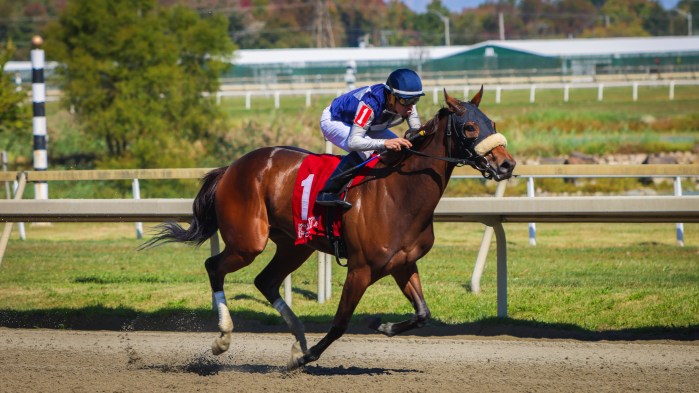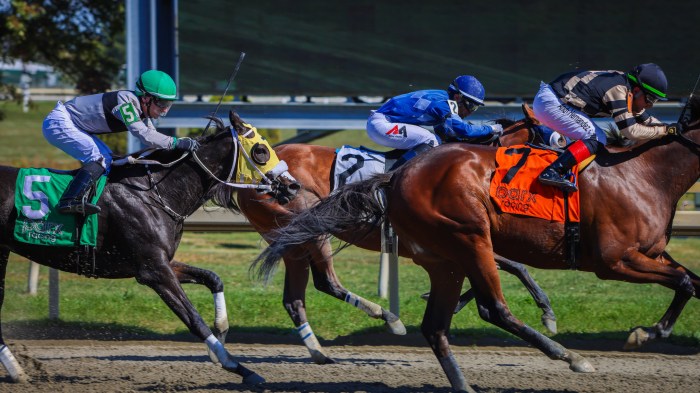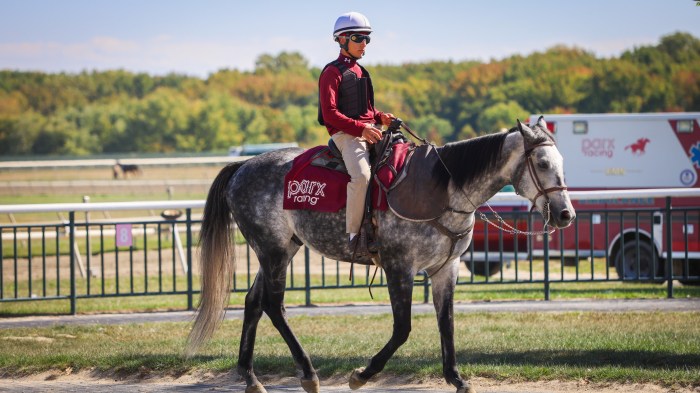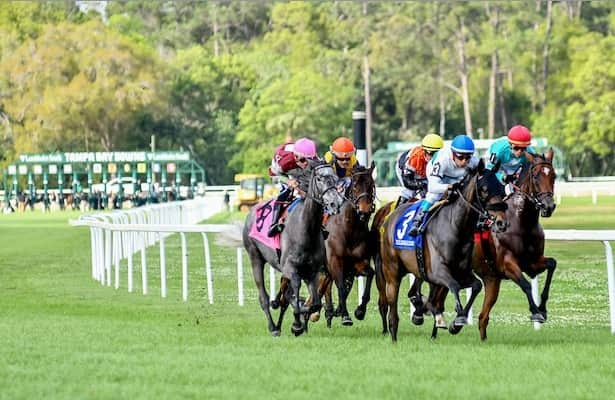Champion or casualty: An in-depth look at horse racing deaths in Pennsylvania – Metro Philadelphia

There have been more than 10,000 horse racing deaths nationwide over the past 10 years, according to Horseracing Wrongs.
Almost 900 of them were in the state of Pennsylvania.
440 of them at Parx Racing.
Just this year, there have been 21 horse racing deaths at Parx, located in Bensalem just outside Philadelphia, including two on Pennsylvania Derby Day.
“We’re not interested in any so-called welfare improvements,” said Patrick Battuello, Founder and President of Horseracing Wrongs, a nonprofit advocating for animal rights and calling to end horse racing in the United States. “The fact is that horse racing kills. It’s inherent to what they do, a certain level of killing is absolutely guaranteed.”
Since its founding in 2014, Horseracing Wrongs have documented 891 deaths in Pennsylvania. The fatalities have decreased slightly in the past couple of years, which Battuello attributes to less racing, not improved safety.
While Pennsylvania has not made any regulatory or fiscal changes to horse racing in the past several decades, the federal government passed the Horseracing Integrity and Safety Act, HISA, in 2021. It created a private, self-sustaining nonprofit that “must develop rules related to horse racing, including anti-doping, medication control and racetrack safety rules.”
“The problem with HISA is this—supposedly, they’re collecting data on deaths at all of the racetracks under their jurisdiction. But they don’t release that data. They give you a number, but they don’t give you any specifics. When I appealed to them and put a FOIA request in, they said, ‘we’re a private agency,’ so I went to the Federal Trade Commission, which ostensibly is the federal agency supervising HISA,” Battuello explained. “They gave me this convoluted response, saying, ‘We are responsive to FOIA, but we don’t have that information. HISA does, and you would have to go to HISA,’ but HISA is a private agency, and they’re not bound by FOIA law.
“So it’s a big run around. My opinion is that HISA is just a public relations move. It was something that they needed to do to get the industry to take some of the pressure off the industry.”

When asked if the HISA regulations are enough to protect the horses, Joe Wilson, COO of Parx Racing stated, “I think everybody is involved in protecting horses. And I can tell you that nobody wants to see a horse get injured. We just don’t. These horses are very well taken care of. They’re loved. They love to run.”
The sport of horse racing has declined in recent years — since 2000, 46 tracks have closed. But state money still flows into the industry. Currently, Pennsylvania is investing a little under $200 million into horse racing through the Pennsylvania Race Horse and Game Development Act, which aims to protect the public from unlawful gambling practice while promoting economic development within the industry.
In 2020, former Pennsylvania Gov. Tom Wolf proposed defunding the Race Horse Development Trust, which was swiftly shut down.
“State sanctioned gambling in Pennsylvania, New York and most states are supposed to benefit education,” said Battuello. “That’s what Gov. Wolf was trying to do – bring the money back into education. We’re cheating children out of tens of millions of dollars every year to prop up this industry.”

What is now known as Parx Racing, opened in November 1974, and is now one of six racetracks left in Pennsylvania.
“Horse racing employs a lot of people in the Commonwealth,” said Wilson. “It’s not just directly, people that you know are involved in racing. It’s people that supply materials and goods for racing, whether that be farmers growing hay, straw and feed, companies, veterinarians and everything else.”
But horse racing still has an impact on the state and national economy. According to a study out of Penn State, Horse racing has a $314 million effect on the Pennsylvanian economy and directly affects 3,778 jobs.
Revolution Philadelphia is a woman-led animal advocacy group working to get animal rights laws passed. They held a protest on the Pennsylvania Derby Day, when two horses died.

“We really just need to work on educating the public and educating lawmakers,” said Stephanie Curson, Head Organizer and board member of Revolution Philadelphia. “I think a lot of lawmakers are unaware that the $200 million is going to prop up this industry, and that it could go to things like education, property taxes.”
Revolution Philadelphia is planning protests outside Parx Racing on Oct. 19 and Nov. 2, both starting at noon.
Battuello drew a comparison to dog racing—highlighting that there are only two dog racing tracks left in the country.
“Yet horse racing gets this cover under the banner of sport, the sport of kings, right? It’s been sold to us. So our job is to get people to reassess that, to look at it through a fresh lens, stop thinking of it as a sport, and see it for what it is — slaughter.”
Related
Leading Parx jockey Sanchez will serve 7-day suspension
Photo: Jason Moran / Eclipse Sportswire Jockey Mychel Sanchez will serve a seven-day suspension and pay an additional $1,750 in fines
Bill Mott talks about plans for Sovereignty, Just F Y…
Photo: Gulfstream Park / Lauren King Sovereignty, dramatic late-running winner of the Fountain of Youth (G2) March 1, is being pointed
Up-and-coming Cavalieri chases Grade 1 glory in Beholder Mile
Photo: Santa Anita / Benoit Photo Cavalieri and Alpha Bella, who finished one-two in the Grade 3 La Cañada in January at Santa Anita,
4 stakes showcase shipping stars on Tampa Bay undercard
Photo: Gonzalo Anteliz Jr. / Eclipse Sportswire The stars will shine Saturday at Tampa Bay Downs, and not just in the Grade 3 Tampa Ba











